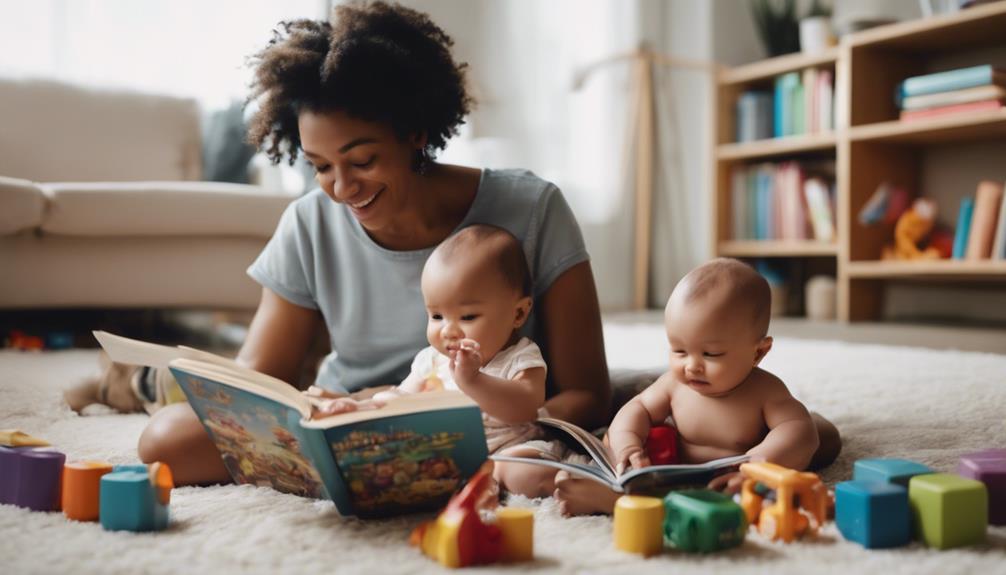Reading aloud to your little one is super important! It helps their **brain grow**, making them smarter. Plus, it brings you closer and creates a special **connection**. Reading early on paves the way for better **reading skills** later in life. Make it a habit, boost their words and make them great listeners. Use fun ways to keep them interested, like asking questions and using your hands. Choosing different books helps them see the world in new ways. Discover more about this important skill for your little one’s development journey. Dive into the world of reading, it’s worth every page!
Key Takeaways
- Enhances verbal communication skills and language development.
- Fosters emotional bonding between parent and child.
- Establishes a strong foundation for future academic success.
- Stimulates cognitive development and boosts brain function.
- Cultivates a love for learning and literacy from an early age.
Importance of Reading Aloud
Reading aloud to your baby is an essential activity that has numerous benefits for their development and well-being. Regular reading sessions play a significant role in enhancing language development, stimulating imagination, and laying the foundation for early brain development.
By engaging in reading activities with your baby, you aren't only promoting their language skills but also fostering social and emotional skills that are important for their overall growth.
Furthermore, reading aloud contributes to establishing routines, promoting bonding between you and your baby, and aiding in emotional learning. These aspects are key in developing a sense of security and emotional well-being in your little one.
Additionally, starting reading sessions early can help set bedtime routines, leading to better sleep patterns.
In the long term, the benefits of reading to your baby extend to school success by building the necessary language skills and cultivating a love for reading that will be invaluable in their academic journey.
Cognitive Development Benefits

Reading to your baby boosts brain development by stimulating neural pathways and enhancing cognitive functions. It also helps in improving language skills, memory retention, and attention span early on.
Boosts Brain Development
Engaging your baby with books early on can greatly enhance their cognitive development by stimulating key areas of the brain responsible for language and critical thinking skills. Reading to your baby boosts brain development, supporting the formation of neural connections essential for learning and memory.
This early exposure to language-rich environments through reading sessions can lead to improved literacy outcomes and advanced cognitive abilities. Research indicates that babies who are read to frequently tend to have larger vocabulary sizes and better comprehension skills later in life.
Enhances Language Skills
By exposing your baby to a diverse range of words through regular reading sessions, you're greatly enhancing their language skills and contributing to their cognitive development. Books provide a vast array of vocabulary that goes beyond everyday conversations, enriching your baby's language comprehension and communication abilities.
When you read aloud to your baby, you stimulate brain activity related to language and communication, aiding in the development of their speech and language skills. By introducing your baby to a broad set of words, reading helps them convey complex ideas and thoughts effectively as they grow.
Regular reading sessions lay the foundation for effective verbal communication skills, benefiting their overall cognitive development. So, grab a book, read to your little one, and watch as their language skills flourish, their vocabulary expands, and their communication abilities improve, all thanks to the power of reading.
Emotional Bonding Through Reading
Through the shared experience of story time, parents and their babies establish a deep emotional bond. Reading to your baby goes beyond just words on a page; it creates an emotional connection that strengthens the parent-child relationship.
Here are some key ways reading fosters emotional bonding:
- Shared Activity: Reading together becomes a special shared activity that builds closeness.
- Intimacy: One-on-one reading sessions foster intimacy and create cherished moments.
- Trust: Regular reading instills a sense of trust in the child towards the parent.
- Security: The routine of reading provides a feeling of security and comfort for the baby.
- Connection: Engaging in stories leads to ongoing conversations that deepen the emotional bond.
Language Skills Enhancement

Reading to your baby not only strengthens your emotional bond but also enhances their language skills greatly. By engaging in regular reading sessions, you are actively contributing to the development of their vocabulary, speech, and verbal communication skills. Here's how reading can enhance your baby's language skills:
| Language Skills Enhancement | |
|---|---|
| Benefit | How it Helps |
| Vocabulary Expansion | Exposure to a variety of words not commonly used in everyday conversations. |
| Speech Development | Stimulates brain activity related to language, aiding in speech and language development. |
| Verbal Communication Skills | Encourages effective verbal communication by helping absorb pronunciation and grammatical patterns. |
Reading aloud to your baby introduces them to new words, stimulates their brain, and enhances their ability to communicate effectively. These benefits lay a strong foundation for their future language development.
Early Literacy Foundation

How can you establish a strong early literacy foundation for your baby?
By focusing on early literacy skills and language development, you can set the stage for your child's future academic success and overall growth.
Here are five essential ways to build this foundation:
- Start Early: Introduce books and reading routines from infancy to familiarize your baby with language and storytelling.
- Create a Reading Routine: Regular reading sessions help establish a habit that promotes literacy skills and strengthens the parent-child bond.
- Encourage Interaction: Engage your baby during reading time by pointing at pictures, asking questions, and allowing them to touch the book.
- Choose Diverse Books: Expose your baby to a variety of books with different themes, characters, and styles to enrich their language development.
- Utilize Rhymes and Songs: Incorporate nursery rhymes and songs into your reading routine to enhance language skills and stimulate brain development.
Social Skills Nurturing

Reading to your baby not only strengthens your bond but also helps in building empathy skills.
By engaging in shared reading experiences, you encourage communication development and enhance your child's social skills.
These interactions foster trust, security, and emotional connections that are essential for healthy relationships.
Building Empathy Skills
Encouraging your baby to engage with stories that showcase diverse emotions and perspectives can play a significant role in nurturing their social skills, particularly in building empathy. Through reading, babies learn to recognize and understand emotions in others, fostering empathy and emotional intelligence.
Books with diverse characters and themes can teach babies about empathy, kindness, and understanding towards others. Reading stories about characters facing challenges can help babies develop compassion and empathy towards others.
Engaging with stories that depict empathy and compassion can help babies learn how to relate to and connect with others.
- Exposure to diverse emotions and perspectives in stories
- Understanding and recognizing emotions in others
- Learning empathy, kindness, and understanding
- Developing compassion towards others
- Relating to and connecting with others through stories
Encouraging Communication Development
To further enhance your baby's social skills, focusing on encouraging communication development is essential. Reading to your baby plays a significant role in nurturing their verbal communication skills and overall social abilities. Regular reading sessions not only expose your baby to language but also create a bonding experience that strengthens the communication between you and your child. Through reading aloud, babies learn the importance of listening, turn-taking, and engaging in conversations, which are all critical aspects of effective communication.
| Benefits of Reading to Your Baby | |
|---|---|
| 1. Enhances verbal communication skills | |
| 2. Builds a strong foundation for future communication | |
| 3. Fosters listening and conversational abilities | |
| 4. Creates a bonding experience between parent and child |
Academic Success Connection

By exposing your baby to early reading experiences, you can lay a solid foundation for their future academic success. Reading to babies not only cultivates language and literacy skills but also instills foundational abilities vital for their educational journey.
Here are five key connections between reading to babies and academic success:
- Improved Academic Performance: Early exposure to reading has been linked to enhanced academic success later in life.
- Enhanced Language and Literacy Skills: Children who are read to regularly tend to exhibit higher language and literacy proficiency in school.
- Development of Foundational Skills: Reading to babies helps in building fundamental skills necessary for academic achievement.
- Fostering a Love for Learning: Early reading experiences can nurture a love for learning, shaping future educational pursuits.
- Long-Term Impact: Studies demonstrate a direct correlation between early reading habits and sustained academic success over time.
Reading Frequency Recommendations

When it comes to reading to your baby, establishing a consistent daily routine is key to promoting early literacy and language development. Experts recommend dedicating at least 15 minutes each day to reading to your baby. This habit of reading not only helps in language development but also enhances cognitive skills and emotional bonding.
By establishing a routine of reading before naptime and bedtime, you can instill a love for books and learning in your little one. Regular reading sessions with your baby can improve vocabulary, listening skills, and memory retention. Consistent reading habits create a positive association with books and reading from an early age.
Interactive Reading Techniques

Engaging with your baby through interactive reading techniques is a powerful way to promote their language development and cognitive skills.
Interactive reading involves more than just reading the words on a page; it involves actively involving your baby in the storytelling process.
Here are some tips to make your reading sessions more interactive and beneficial for your little one:
- Ask Questions: Encourage your baby to think about the story by asking simple questions like 'What do you see?' or 'What do you think will happen next?'
- Use Gestures: Incorporate gestures like pointing to pictures or making relevant sounds to make the story come alive for your baby.
- Encourage Participation: Invite your baby to turn the pages, touch different textures in the book, or mimic sounds from the story.
- Make Connections: Help your baby connect words to actions by linking the story to real-life experiences.
- Promote Social Interaction: Reading together fosters bonding and communication between you and your baby, enhancing their social skills.
Diverse Book Selection Importance

Selecting diverse books for your baby is essential as it exposes them to various cultures, viewpoints, and life experiences.
By incorporating different characters and settings, you help your child develop empathy, understanding, and a respect for diversity right from the start.
Reading diverse books not only enhances their literacy skills but also nurtures inclusivity and acceptance in a multicultural society.
Book Diversity Benefits
Choosing diverse books for your baby's reading collection is essential for introducing them to a wide range of cultures, races, and experiences. Reading aloud from a diverse selection of books can have significant benefits for your baby, promoting empathy and inclusivity. Here are some reasons why book diversity is advantageous for your little one:
- Diverse book selection exposes babies to a variety of cultures, races, and experiences, promoting empathy and inclusivity.
- Reading diverse books helps babies develop a broader perspective of the world around them.
- Exposing babies to diverse characters and settings in books fosters understanding and acceptance of differences.
- Incorporating books with diverse themes and characters encourages critical thinking and open-mindedness in babies.
- Providing a range of diverse books ensures that babies see themselves represented and learn about others from different backgrounds.
Cultural Representation Impact
Introducing your baby to a diverse selection of books plays a crucial role in shaping their cultural understanding and self-identity. By reading diverse books, you expose your child to different cultural representations, fostering inclusivity and cultural awareness.
Seeing themselves reflected in literature promotes self-esteem and cultural pride, while also developing empathy and tolerance towards others. Through diverse books, your baby gains exposure to various perspectives and experiences, expanding their worldview and promoting acceptance of diversity.
Additionally, diverse book selections help challenge stereotypes and biases, encouraging critical thinking and open-mindedness. Including culturally diverse books in your child's reading routine enhances their cultural awareness and appreciation for the richness of diversity in the world.
Early Literacy Development
Diverse book selection during early literacy development enriches your baby's understanding of the world and nurtures their cognitive growth. By exposing your little one to a variety of cultures, perspectives, and experiences through reading, you're laying a strong foundation for their future learning.
Here are some key benefits of incorporating diverse books into your baby's reading routine:
- Promotes empathy and inclusivity: Exposure to diverse books from an early age fosters empathy, understanding, and inclusivity.
- Encourages critical thinking: Reading diverse books helps babies develop a more inclusive worldview and appreciation for diversity.
- Enhances cognitive development: Diverse book selection contributes to cognitive development, critical thinking, and social awareness in babies.
- Expands vocabulary: Introducing a variety of words and concepts through diverse books helps babies build a rich vocabulary.
- Fosters love for learning: Incorporating diverse books in early literacy development fosters a love for learning and encourages curiosity about the world.
Start Reading today and watch your baby thrive!
Frequently Asked Questions
Why Is It Important to Read to Babies?
Reading to babies is essential for their language development, imagination, and emotional bond with you. It introduces new words and social skills. Establishing a reading routine helps them learn sounds and meanings, building a strong foundation for literacy.
At What Age Should You Read to Your Baby?
You should start reading to your baby as early as birth. Reading helps with language development and sets a good routine. Even a few minutes daily can make a big difference in their skills and love for books.
Why Should You Read to Your Baby in the Womb?
Reading to your baby in the womb helps them recognize your voice, fostering early bonding. It stimulates brain development and language skills, laying a strong foundation for future learning. Plus, research suggests they can remember stories post-birth.
What Are the Benefits of Reading to Your Child?
Reading to your child fosters language skills, sparks imagination, and strengthens your bond. It introduces new words, enhances social skills, and helps with early literacy. Make it a habit to boost their learning and cognitive development.
Conclusion
To sum up, reading to your baby is like planting seeds of knowledge that will grow with each page turned.
So, grab a book, cuddle up, and watch your little one's mind blossom.
Remember, the bond you form through reading is a treasure that will last a lifetime.
Happy reading!










